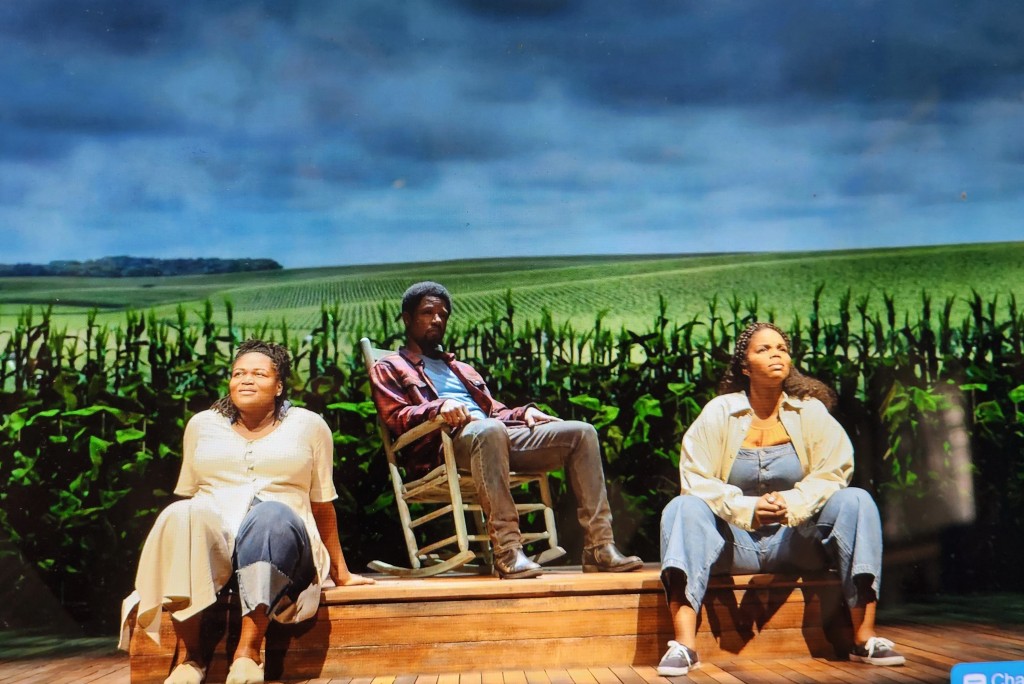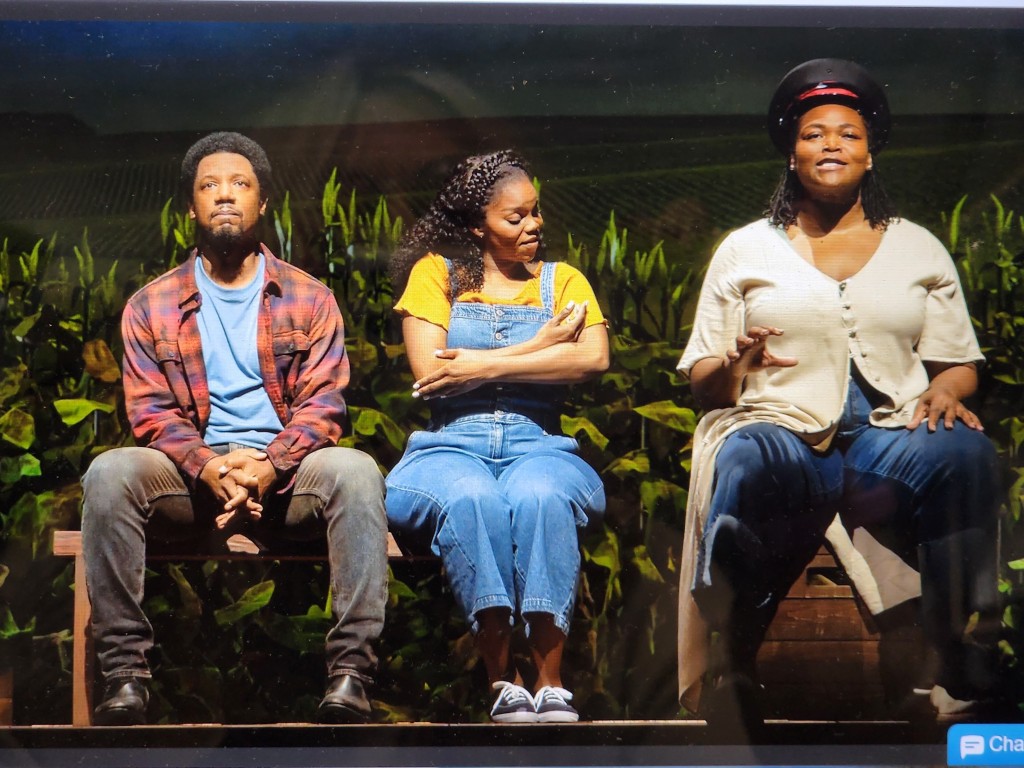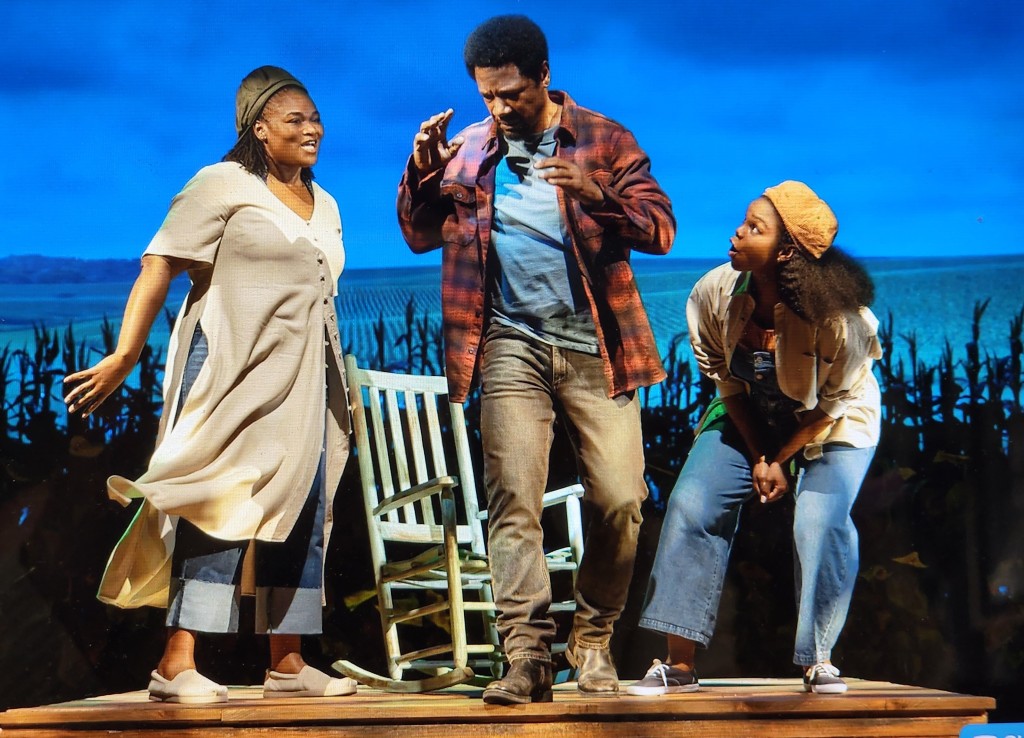‘Home,’ The Journey of a Lifetime in Wisdom and Poetry, Review

With lyricism and poignancy in this Roundabout Theatre Company revival of Home, directed by Kenny Leon, Samm-Art Williams spins a story of life’s rhythms, spanning decades during the Great Migration, the time when thousands of Blacks moved with hope to northern cities, leaving Jim Crow’s economic oppression and lynching violence behind. Williams’ covers distances and cultural spaces, all the while evolving his protagonist’s mental, physical and spiritual well being. Home has been receiving a “warm welcome,” at the Todd Haimes Theater, after a prolonged lapse since its original production in 1980 when it was Drama Desk and Tony-award nominated.
Starring Tory Kittles as Cephus Miles, newcomers Brittany Inge and Stori Ayers, portray a multiplicity of characters (40+) from family members to the men and women positively or negatively rubbing up against Cephus on his journey to self-realization. Williams’ representatives move us from a tobacco farm in Cross Roads, North Carolina to a prison in Raleigh, to a northern city (New York), of subways, a roiling, feverish, chaotic place for Cephus that spills out a never-ending cacophony of noise, colors, struggle and conflict.

Then finally, a battered, bruised and reformed drug and alcohol-addicted Cephus has had enough. By that point, he has died to his ego to return home to the rich black soil he thought he had lost, and God’s grace, which was apparently late in coming, but actually was with him all along.
It takes wisdom to know that God has been with him, which he has obviously gained as it is subtly expressed by the ersatz Greek chorus (Inge and Ayers), who introduce the theme of God’s grace which we and Cephus learn abides throughout his life. (“If there was ever a woman or man, who has everlasting grace in the eyes of God. It’s the farmer woman… and man.”) As Inge and Ayers repeat these affirmations as Woman Two and Woman One at the top of play and in a brief song and rhythmic summation of the life of the farmer/sharecroppers who labored and sweat under the sun, then left for the cities, they state that one “fool” came back. And Cephus, “the fool” sits in a rocking chair center stage listening to them.

Cephus, is anything but a fool. His travels have converted him to a contented man of wisdom who has learned, through patience, the hard lesson of God’s everlasting grace. Though we don’t realize it at the top of the play, Cephus has returned from his odyssey. The townspeople’s myths swirl around him (via Inge and Ayers), and town children (Ayers and Inge), whisper the rumors, “Old Cephus Miles. Can’t be saved,” that “he’s dead,” that “he’s a ghost,” as they throw rocks at the windows of the “haunted house,” where he has returned to claim “I’m alive,” “I’m flesh, blood and bone.”
The play is Cephus’ lyrical and dramatic life told in flashback, at times in and out of sequence, like an epic tone poem with the chorus (Ayers and Inge), at the ready to activate his narration, an exegesis exploring and explaining the spiritual text of the grace that threads through his life.
Against a backdrop of tobacco plants, corn stalks, golden lighting by Allen Lee Hughes and a projection of distant acres of crops to the horizon line (the projection changes when Cephus moves to the city), Leon employs a symbolic minimalism of set and props (set design-Arnulfo Maldonado). He adjusts scene changes based on the dialogue and simple objects, a box, a chair, a drop-down cross. Dede Ayite’s costumes and Ayers and Inge’s hair (Nikiya Mathis-hair & wig design), essentially remain the same with a few additions and subtractions (hats, scarves, hair let down-a wig). Miraculously, Leon’s simplicity which fits the thematic, lyrically flowing style of this work, is not only fitting, it is revelatory. However, it is also arcane and opaque at times.

Ultimately, Williams/Leon’s symbolic translation of Cephus’ seemingly “ordinary” existence becomes a spiritual guidepost that focuses on uplifting the souls of those who witness it. Thus, we gradually understand why Cephus quietly dismisses the extraordinarily horrid conditions of racism in the Jim Crow south. Slowly we realize how he withstands injustice related to his poverty and lack of education. That impact is demonstrated when Cephus, unlike those whites who paid to get bone spur deferments or were deferred by college, is drafted during the Viet Nam war. Many Blacks who were unable to get such deferments fought and died in the jungles. He reads the letters of two friends who warn him off going to fight.
But fear didn’t stop Cephus from serving. God’s commandment, “Thou shalt not kill,” stops him. A religious conscientious objector, he spends five years in prison because he refuses to kill in battle. After his imprisonment, Cephus gives up sharecropping and heads north. He has tethered his happiness to Pattie Mae, the love of his life, and thinks he may get an education and “improve” himself like she did. Her mother prompted her to go north, get an education, became a teacher and forget about marrying Cephus because she was “better” than he.
However, at this point in his life, destitute and without friends or shelter, somehow Cephus ends up in the city where life befalls him as he waits for God to “come back from Miami” and help him deal with countless issues. Life takes an unbelievable turn for him and he questions God’s absence. With humor Williams relates Cephus’ travails and shares stories out of the traditions of citified Black folk and stories from his country childhood, i.e. his time in the hayloft with Pattie Mae, gambling in the cemetery with friends, loss of close family members and more. Home presents the important and crucial moments in Cephus’ life under the long arm of God, who he prays to, sometimes.

Caught up in the emotionalism of his pain, Cephus, delivered in an incredible performance by Kittles, draws us in and keeps us engaged with humor bytes and memes that reoccur and have their final concluding day. The ending is more than a satisfactory relief and it is the first time we see Cephus grin from ear to ear. Indeed, he has come home in relating and reliving his journey with us with the dogged and wonderful supporting help of Inge and Ayers.
Williams’ style and poetic form is easy listening, as one catches the music inherent in the language and the word beats. At times, however, the pacing and lack of theatricality are uneven and I found myself drifting, despite the tremendous performances of the actors. Overall, the ensemble and their direction by Leon are smashing, as is Williams’ Homeric view which provides a look at war and battle in the human psyche filtered through the American Black experience.
This is one to see. Unless it is extended, the end date is July 21.
Home. Todd Haimes Theatre. 224 West 42nd Street with no intermission. https://www.roundabouttheatre.org/
Posted on June 9, 2024, in Broadway, NYC Theater Reviews and tagged Brittany Inge, Home, Kenny Leon, Roundabout Theatre Company, Samm-Art Williams, Stori Ayers, Todd Haimes Theatre, Tory Kittles. Bookmark the permalink. Leave a comment.
Leave a comment
Comments 0